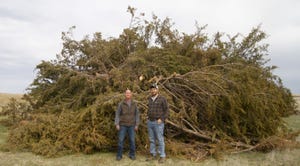Go one on one
I remember the very first Earth Day on April 22, 1970. Our science class was assigned to go out and document environmental degradation
March 1, 2010

I remember the very first Earth Day on April 22, 1970. Our science class was assigned to go out and document environmental degradation. So my lab partner and I drove around and pulled a half-dozen water samples in pint-sized canning jars from the creek that flowed through town.
We pulled the samples from quiet pools to fast-moving water, so the particulates ranged all over the board. Testing wasn't part of the exercise; it was more a visual exercise designed to build awareness.
Earth Day was a brilliant grassroots campaign. Its founder, the late Sen. Gaylord Nelson (D-WI), hoped the observance might tap into the vigor of the anti-war and civil-rights movements of the day. He succeeded; in fact, for some folks, Nelson ended up inventing a new “religion,” with its most basic premise being that any human activity or enterprise is essentially bad for the planet.
The world today is full of adversaries to agriculture, meat production and our agrarian way of life. Consumers are bombarded daily with misinformation and outright lies about our stewardship of resources and animals, and the healthfulness of the product we produce.
As beef producers, do you know that, according to the Environmental Protection Agency, the entire U.S. agricultural sector accounts for only 6.4% of total U.S. greenhouse gas emissions, and livestock production is only a portion of that total?
How about the fact that 85% of U.S. grazing lands are unsuitable for producing crops? By grazing animals on this land American ranchers can more than double the area that can be used to produce food.
And, nearly 90% of U.S. cattle farms and ranches are family-owned and operated, with two-thirds of them having been under the same family ownership for two generations or more.
Those facts may not surprise you, but they're likely news to the other 98% of Americans who don't rely on the land for their livelihood. You can wait for someone else to get the message out or you can get involved. Surveys indicate the public trusts folks in agriculture; you need to get one-on-one with the public.
Ron Torell, University of Nevada Extension livestock specialist, has a great idea. He suggests all producers make a concerted effort to touch everyone they know with positive messages about beef production.
Compose a message — it doesn't have to be long — and spread it widely on April 22 to your entire email list or social media friends. Just include a few points about the industry, its importance to the economy, this industry's values of hard work and family, our stewardship of water, the land and air, and/or the great nutrition and healthfulness of the product we produce — beef. Then send it electronically to everyone you know.
It's an idea with merit. Next month, we'll provide you with some resources and sample letters. Stay tuned.
About the Author(s)
You May Also Like
.png?width=300&auto=webp&quality=80&disable=upscale)


